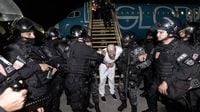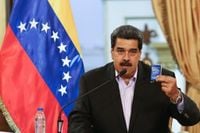In a significant turn of events, U.S. intelligence agencies have contradicted President Donald Trump’s justification for invoking the 1798 Alien Enemies Act to expedite the deportation of Venezuelan men, particularly those associated with the gang Tren de Aragua (TDA). A declassified memo released on May 6, 2025, reveals that the Venezuelan government, led by President Nicolás Maduro, does not exert direct control over TDA, undermining the administration's claims that the gang operates under Maduro's directive.
The memo, which was obtained by the Freedom of the Press Foundation and subsequently reported by The New York Times, outlines findings from the National Intelligence Council (NIC) dated April 7, 2025. It states, "The Maduro regime probably does not have a policy cooperating with TDA and is not directing TDA movement to and operations in the United States." This assessment highlights a critical divergence in the understanding of the relationship between the Venezuelan government and TDA, suggesting that while the Maduro regime tolerates the gang’s presence, it does not actively collaborate with it.
The NIC memo indicates that the Maduro administration views TDA as a security threat, which complicates the narrative put forth by the Trump administration that TDA is invading the U.S. at Maduro’s behest. The report notes, "Venezuelan intelligence, military and police services view TDA as a security threat and operate in ways that make it highly unlikely the two sides would cooperate in a strategic or consistent way." This finding is crucial, especially in light of the Trump administration's recent actions, which included sending around 250 Venezuelan migrants to a notorious prison in El Salvador without due process.
According to the memo, the FBI holds a slightly different view, suggesting that some Venezuelan officials may facilitate the entry of TDA members into the U.S. for their own gain. However, the broader intelligence community remains skeptical about any systematic cooperation between the Maduro government and TDA, emphasizing that such coordination would require extensive logistics and funding that have not been observed.
The Alien Enemies Act, which Trump invoked in March 2025, allows for the deportation of individuals from countries at war with the U.S. or engaged in an invasion of U.S. territory. Historically, this law has been used sparingly, only three times before 2025, all during wartime. Trump's administration characterized TDA as a terrorist organization, claiming that they were conducting irregular warfare against the U.S. at the direction of the Maduro regime.
After the April 2025 report surfaced, a federal judge ruled that Trump's invocation of the Alien Enemies Act was unlawful, stating that the president cannot simply declare a foreign government as a threat without substantial evidence. This ruling came as a significant setback for the Trump administration, which has faced increasing scrutiny over its immigration policies and the treatment of Venezuelan migrants.
In response to the intelligence report, Tulsi Gabbard, the Director of National Intelligence, defended the administration's actions, arguing that they are necessary to protect American citizens from violent criminals. Gabbard stated, "Illegal immigrant criminals have raped, tortured, and murdered Americans, and still, the propaganda media continues to operate as apologists for them." This statement reflects the administration's ongoing efforts to frame its policies as vital to national security.
The release of the memo has sparked debate among lawmakers. Democratic representatives Jim Himes and Joaquin Castro welcomed the findings, asserting that they reinforce the ruling against the administration's use of the Alien Enemies Act. They have called for further explanations from Gabbard regarding the discrepancies between her public statements and the intelligence community's findings.
On the other hand, Republican Senator Tom Cotton expressed his support for Trump's policies, emphasizing the need to protect Americans from perceived threats posed by TDA. He criticized Democrats for allegedly defending foreign criminals at the expense of American safety.
As the situation unfolds, the implications of the NIC memo could have far-reaching consequences for U.S. immigration policy and the treatment of Venezuelan migrants. The American Civil Liberties Union has already initiated legal action to challenge the deportations carried out under the Alien Enemies Act, arguing that many of those affected have no ties to criminal activity.
The memo also highlights the complexities of the relationship between the Venezuelan government and criminal organizations like TDA. While the Maduro regime may tolerate the gang's activities to some extent, the intelligence community's assessment suggests that it does not orchestrate their operations. This nuanced understanding could impact future U.S. policies regarding immigration and security.
In conclusion, the declassified intelligence memo represents a pivotal moment in the ongoing discourse surrounding U.S. immigration policy and the Trump administration’s approach to national security. As lawmakers continue to grapple with the implications of these findings, the future of Venezuelan migrants and the broader immigration landscape remains uncertain.






